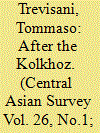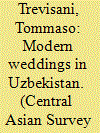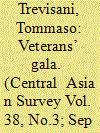| Srl | Item |
| 1 |
ID:
080402


|
|
|
| 2 |
ID:
144162


|
|
|
|
|
| Summary/Abstract |
Under the new conditions of independence, wedding ceremonies in Uzbekistan have increasingly diversified along growing social and economic divides. Recent state measures to curb ritual expenditures follow the furrow of a long tradition of criticism against ritual prodigality which, however, falls short of its self-set target of enforcing more ‘rational’ rituals. Based on fieldwork conducted in the Ferghana Valley, this paper sheds a new light on the controversy around ‘excessive ritual expenditures’ by discussing tensions in local practices arising from changing livelihoods and consumption patterns, on the one hand, and, on the other, from an ambivalent state policy that aims at containing ritual expenditures and social polarization, while also promoting an ideal of modern wedding that undermines the very aim of the policy.
|
|
|
|
|
|
|
|
|
|
|
|
|
|
|
|
| 3 |
ID:
168832


|
|
|
|
|
| Summary/Abstract |
Since its privatization in 1995, Kazakhstan’s largest steel mill has been in a restructuring process characterized by workforce reduction, augmented pressure on remaining jobs and labour conflict over wages, work conditions and corporate social responsibility. In 2013, in an attempt to re-establish harmonious relationships with workers, management invited the mill’s former labour aristocracy to join a newly established veterans’ council, a forum resembling traditional aksakal councils, to discuss the company’s difficult situation. In the context of a banquet in honour of the veterans, tradition became the contested terrain over which labour and capital struggled to endorse their own visions of the industrial future. As corporate capitalist visions of efficiency and professionalism, ethno-national concerns for harmony and stability, and practices rooted in the Soviet labour legacy clash, tradition is staged by actors as a practice which can either affirm or challenge industrial leadership in a labour conflict.
|
|
|
|
|
|
|
|
|
|
|
|
|
|
|
|